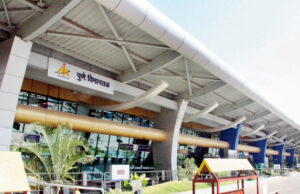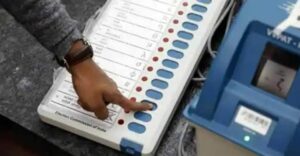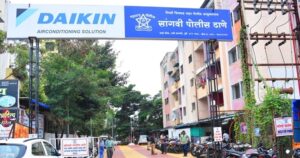International Conference on TRANSFORMING INDIA 2030 by Symbiosis
Pune, February 20, 2017: Symbiosis International University’s, Faculty of Humanities and Social Sciences (FoHSS) conducted an International Conference on, “TRANSFORMING INDIA 2030: STRATEGIES FOR SUSTAINABLE DEVELOPMENT GOALS” on 16th & 17th February, 2017. The conference was inaugurated on 15th February, 2017 at the hands of Mr. Yuri Afanasiev, UN resident Coordinator and UNDP Resident Representative in India; Prof. Sukhadeo Thorat, Chairman, Indian Council of Social Science Research, Prof. Dilip Nachne, Professor Emeritus, Indira Gandhi Inst. Of Development Research & Member, Prime Minister’s Economic Advisory Council, Dr. S.B Mujumdar, Chancellor, SIU and Mr. Derk Segaar, Director, United Nations Information Centre for India & Bhutan.
Speaking on the occasion Dr. Vidya Yeravdekar, Principal Director, Symbiosis Society, said, “We at Symbiosis International University are extremely proud to host this international conference at our campus. It is our endeavor to give our students and the people attending the conference, an opportunity to meet and discuss on sustainability with eminent people across the globe. The two day conference was a successful event which focused on formulating a strategy for sustainable development.
Presenting the report of the conference, Dr. Jyoti Chandiramani, Dean, Faculty of Humanities and Social Sciences at the university and convenor of the conference,said “That the university will now walk the talk and work in achieving SDGs through collaborative work with various governmental and non-governmental bodies in the country and especially within Pune.
There were total of 4 speakers who shared their knowledge, experience and views onTrack I – ‘Poverty & Inequality’. Prof. Sukhadeo Thorat, Chairman, Indian Council of Social Science Research argued that distribution of income in India is skewed against various social groups based on castes, religion and gender, resulting into group-specific income inequality. Prof. Seeta Prabhu, Tata Chair Professor, Tata Institute of Social Sciences pointed out that SDGs shall not be seen as mere extension of the MDGs as they are targeting ‘Sustainable, inclusive and sustained economic growth, shared prosperity and decent work for all’ through 17 goals and 169 targets with an unprecedented participatory process: CSOs, Academics, think tanks, Open Working Group, Inter governmental committee. Prof. Himanshu, Associate Professor, Jawaharlal Nehru University showed using the latest economic survey 2016 that income share of top 1% , top 0.5 % and top 0.1% of people in the overall income distribution have doubled in the last decade. He further drew attention to the fact that that the acceleration in GDP growth since 2004-05 has also coincided with the worst phase of employment growth with employment growth slowing down to less than 0.1% per annum, the lowest in the post-independence history. Ms Biraj Swain Senior Adviser, IntraHealth International and Consulting Editor at NewsLaundry shed light on variations in poverty definitions which makes the comparison difficult. Young researchers from various parts of the country also presented their current research work on poverty and inequality exploring various aspects like migration, financial inclusion and sanitization.
Track II – ‘Education and Gender’ stressed the importance of quality education. Mr. Derk Segaar, Director, United Nations Information Centre, Delhi said, “Quality Education is the oxygen to development and that it is not just a national priority, but a global priority”. Dr. Rohini Sahni, Professor, Savitribhai Phule Pune University talked of regional disparities quoting the statistic that 64% of English medium schools in Maharashtra are in Mumbai and Pune, whereas many areas do not have even a single English medium school. Dr. Anagha Tambe, Head of Women Studies Department, Savitribhai Phule Pune University said that the mismatch between literacy levels and higher education was largely due to gender inequity.
Panel discussion in Track III – ‘Sustainable Cities’ was chaired by Dr. Partha Mukopadhyay, Senior Fellow, Centre for Policy Research and the panel consisted of Dr. Anant Maringanti, Executive Director, Hyderabad Urban Lab, Dr. Ravikanth Joshi, Urban Finance and Management Consultant and Dr. Vanesa Castan Broto, Lecturer, Bartlett Development Planning Unit, University College London.
Dr. Partha highlighted the dire need for many more qualified urban professionals in India. The panel talked of equity, ecological balance and participatory decision making as the challenges to get to sustainable cities. Dr. Joshi said the lack of accountability and autonomy was crippling Urban Local Bodies (ULBs). In this track, papers presented by academicians ranged on improving the public transport and congestion in cities and the improving the Mula-mutha river in Pune, to name a few.
The panellists in the Track IV on ‘Jobs & Economic Growth’ were Dr. Rathin Roy (Chairperson of the session), Director & CEO, National Institute of Public Finance and Policy; Dr. Sajjid Chinoy, Chief India Economist & Executive Director, J.P. Morgan; Dr. Andreas Bauer, International Monetary Fund’s Senior Resident Representative for India, Nepal and Bhutan and Dr. Rajat Kathuria, Director & Chief Executive, Indian Council for Research on International Economic Relations (ICRIER).
In the opening remarks Dr. Roy noted that production and innovation are at the heart of economic growth. Dr. Sajjid Chinoy felt there is a need for creative destruction and investments showing how the mid-2000s saw high growth rates coupled with low inflation mainly due to the continued flow of investments. Dr. Andreas Bauer commented on policy-making being an art and its dynamic nature. Dr. Rajat Kathuria pointed out the existence of a wedge between job growth and economic growth caused due to the lack of job creation even in the labour intensive sectors.
The Track V on The ‘Partnership for Goals’ was chaired by Dr. Sachin Chaturvedi, Director General at the Research and Information System for Developing Countries (RIS). He opined that a disproportionate burden of SDGs is on developing countries and that technology should be tapped into in achieving these goals. Dr. Nagesh Kumar, Director and Head of the United Nations Economic and Social Commission for Asia and the Pacific (UNESCAP)’s South and South-West Asia Office said that the word will not be able to achieve SDGs without India and this needs massive domestic resource mobilization. Prof Gulshan Sachdeva of Jwaharlal Nehru Univeristy reemphasized need for internal resource mobilization as aid and development assistance from developed nations was rapidly declining. Dr. Volker Treichel added that direct taxation is the best way for resource mobilization and that Goods and Services tax (GST) is not the most efficient solution.
Speaking at the valedictory ceremony, Dr. TCA Anant, Chief Statistician of India outlined the evolution of SDGs from MDGs. He expressed his concern that the SDGs were ambitious, but emphasized the criticality of the goals related to environment for the survival of the planet.







